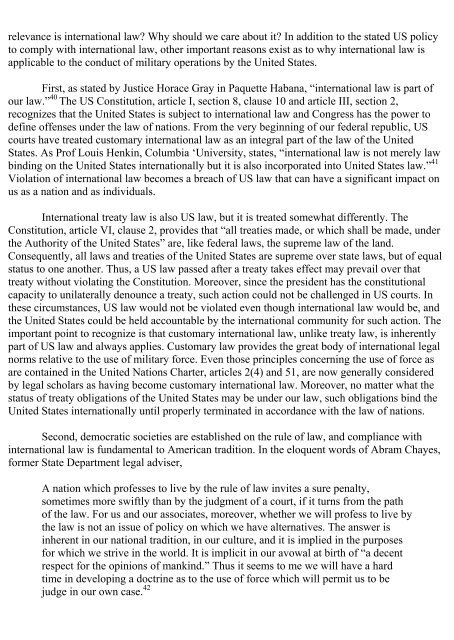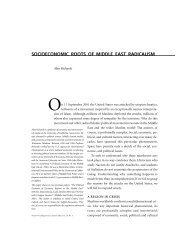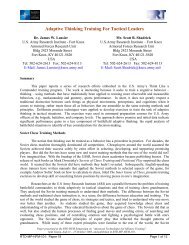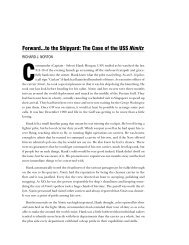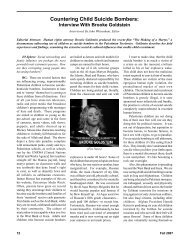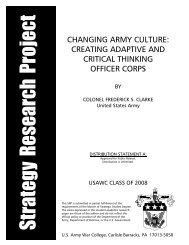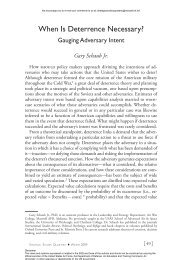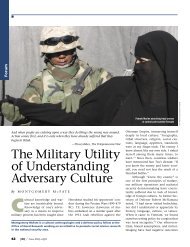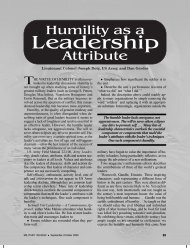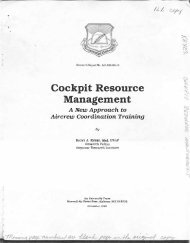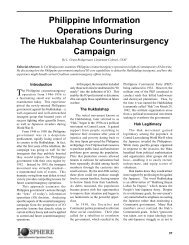Legitimate use of military force against state-sponsored - Air University
Legitimate use of military force against state-sponsored - Air University
Legitimate use of military force against state-sponsored - Air University
You also want an ePaper? Increase the reach of your titles
YUMPU automatically turns print PDFs into web optimized ePapers that Google loves.
elevance is international law? Why should we care about it? In addition to the <strong>state</strong>d US policy<br />
to comply with international law, other important reasons exist as to why international law is<br />
applicable to the conduct <strong>of</strong> <strong>military</strong> operations by the United States.<br />
First, as <strong>state</strong>d by Justice Horace Gray in Paquette Habana, “international law is part <strong>of</strong><br />
our law.” 40 The US Constitution, article I, section 8, cla<strong>use</strong> 10 and article III, section 2,<br />
recognizes that the United States is subject to international law and Congress has the power to<br />
define <strong>of</strong>fenses under the law <strong>of</strong> nations. From the very beginning <strong>of</strong> our federal republic, US<br />
courts have treated customary international law as an integral part <strong>of</strong> the law <strong>of</strong> the United<br />
States. As Pr<strong>of</strong> Louis Henkin, Columbia ‘<strong>University</strong>, <strong>state</strong>s, “international law is not merely law<br />
binding on the United States internationally but it is also incorporated into United States law.” 41<br />
Violation <strong>of</strong> international law becomes a breach <strong>of</strong> US law that can have a significant impact on<br />
us as a nation and as individuals.<br />
International treaty law is also US law, but it is treated somewhat differently. The<br />
Constitution, article VI, cla<strong>use</strong> 2, provides that “all treaties made, or which shall be made, under<br />
the Authority <strong>of</strong> the United States” are, like federal laws, the supreme law <strong>of</strong> the land.<br />
Consequently, all laws and treaties <strong>of</strong> the United States are supreme over <strong>state</strong> laws, but <strong>of</strong> equal<br />
status to one another. Thus, a US law passed after a treaty takes effect may prevail over that<br />
treaty without violating the Constitution. Moreover, since the president has the constitutional<br />
capacity to unilaterally denounce a treaty, such action could not be challenged in US courts. In<br />
these circumstances, US law would not be violated even though international law would be, and<br />
the United States could be held accountable by the international community for such action. The<br />
important point to recognize is that customary international law, unlike treaty law, is inherently<br />
part <strong>of</strong> US law and always applies. Customary law provides the great body <strong>of</strong> international legal<br />
norms relative to the <strong>use</strong> <strong>of</strong> <strong>military</strong> <strong>force</strong>. Even those principles concerning the <strong>use</strong> <strong>of</strong> <strong>force</strong> as<br />
are contained in the United Nations Charter, articles 2(4) and 51, are now generally considered<br />
by legal scholars as having become customary international law. Moreover, no matter what the<br />
status <strong>of</strong> treaty obligations <strong>of</strong> the United States may be under our law, such obligations bind the<br />
United States internationally until properly terminated in accordance with the law <strong>of</strong> nations.<br />
Second, democratic societies are established on the rule <strong>of</strong> law, and compliance with<br />
international law is fundamental to American tradition. In the eloquent words <strong>of</strong> Abram Chayes,<br />
former State Department legal adviser,<br />
A nation which pr<strong>of</strong>esses to live by the rule <strong>of</strong> law invites a sure penalty,<br />
sometimes more swiftly than by the judgment <strong>of</strong> a court, if it turns from the path<br />
<strong>of</strong> the law. For us and our associates, moreover, whether we will pr<strong>of</strong>ess to live by<br />
the law is not an issue <strong>of</strong> policy on which we have alternatives. The answer is<br />
inherent in our national tradition, in our culture, and it is implied in the purposes<br />
for which we strive in the world. It is implicit in our avowal at birth <strong>of</strong> “a decent<br />
respect for the opinions <strong>of</strong> mankind.” Thus it seems to me we will have a hard<br />
time in developing a doctrine as to the <strong>use</strong> <strong>of</strong> <strong>force</strong> which will permit us to be<br />
judge in our own case. 42


